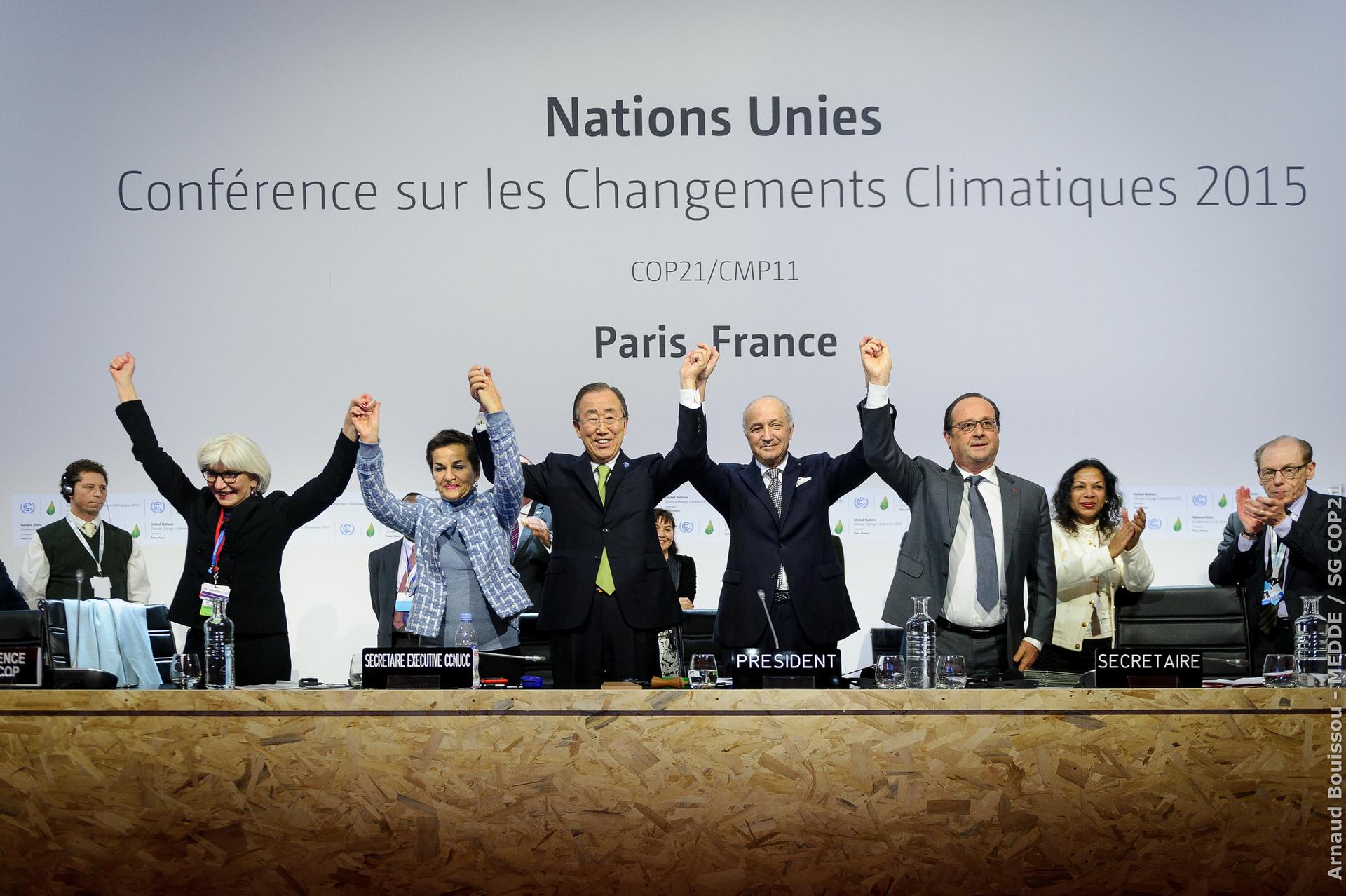A group of GOP elder statesmen is pushing a conservative plan to address climate change
World leaders celebrate the Paris climate agreement of 2015. A group of former GOP leaders says their new carbon dividends plan would bring the US into compliance with the Paris Agreement with less regulation than former President Barack Obama's Clean Power Plan.
A group of conservative elder statesman has proposed an ambitious carbon dividend plan that could entice bipartisan support, pay families $2,000 a month and cut greenhouse gas emissions more than Barack Obama’s Clean Power Plan.
James Baker, a former secretary of state and secretary of the treasury, is leading the launch of this new plan to rein in carbon emissions. It’s called "The Conservative Case for Carbon Dividends." The title aims to entice tax-averse GOP legislators to sign on.
Co-author Ted Halstead of the Climate Leadership Council says the emphasis on dividends, rather than taxes and regulation, is the centerpiece of the bill for one reason:
“The main impediment to solving climate change at the necessary scale and speed is one party in one country,” Halstead says. “The major breakthrough that is needed is getting the Republican party on board for a climate solution that fits the conservative world view. … So, we have three former Republican secretaries of treasury, two former Republican secretaries of state and two former Republican chairs of the Council of Economic Advisers. We also are fortunate to have Rob Walton as a co-author, who is the former chairman of Wal-Mart, the world's largest private employer.”
Economists by and large agree that a carbon tax is the most efficient way to solve climate change, Halstead points out. But for a long time, the problem has been that “proponents of that position have lacked a coherent political strategy to move forward on that issue, because, by itself, a carbon tax is deeply unpopular,” Halstead explains. “So, what we're proposing is a carbon tax with 100 percent of the proceeds going back to the American people in the form of dividends.”
“This is a pro-growth plan. This is a pro-competitiveness plan,” he insists. “This is a plan to reduce regulation and shrink the government, all while saving our climate. So, it's a new synthesis, but it is built on bedrock Republican principles.”
Under the plan, every American would get the same dividend, regardless of wealth or income. The Treasury Department estimates the bottom 70 percent of Americans would come out ahead, meaning they would receive more in dividends than they would pay in added cost for carbon. “That means 223 million Americans stand to benefit from this new solution to climate change. So, it's a real populist climate solution that fits our political moment,” Halstead says.
The carbon tax on emissions would start at $40 per ton, which Halstead calls “the high end of what is politically feasible in Washington today.” That figure would translate to about 36 cents per gallon more at the gas pump. The tax would need to grow over time in order to keep global warming below the limit of 2 degrees Celsius that all world leaders agreed to at the Paris climate conference, Halstead explains.
“If that's the goal, we need to reduce CO2 emissions in America by about 70 percent by midcentury, and in order to accomplish that, you need a tax that's $100 per ton or more,” Halstead says. “But that [can’t be] the starting point. You need to get people comfortable with this. In our paper, we said after five years, a Blue Ribbon commission should analyze whether to continue growing, based on the latest climate data. So, there is a built-in checkpoint after five years.”
The new plan aims to roll back many environmental regulations, in particular, President Obama's Clean Power Plan. Halstead says this may be a tough pill to swallow for many Democrats and environmentalists, but he has a ready answer for them.
“When we put out our statement, we put out a corresponding analysis by two of the top scholars in the field, and what it found is quite stunning,” he says. “It compared our plan to all Obama-era climate regulations, including a full implementation of the Clean Power Plan, and the study found that our plan would achieve nearly twice the emission reductions of all the Obama-era policies combined. What's more, the study also found that, with our plan and our plan alone, America could meet the high end of its Paris commitment with no other policies.”
“So, the logic here is that if you have a powerful enough, market-based policy, you don't need the regulations any more,” Halstead concludes. “Frankly, that is what motivates the Republicans, and that is where we can have a major breakthrough here."
This article is based on an interview that aired on PRI’s Living on Earth with Steve Curwood.
